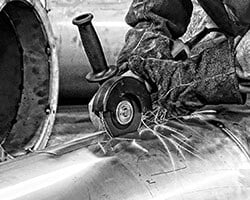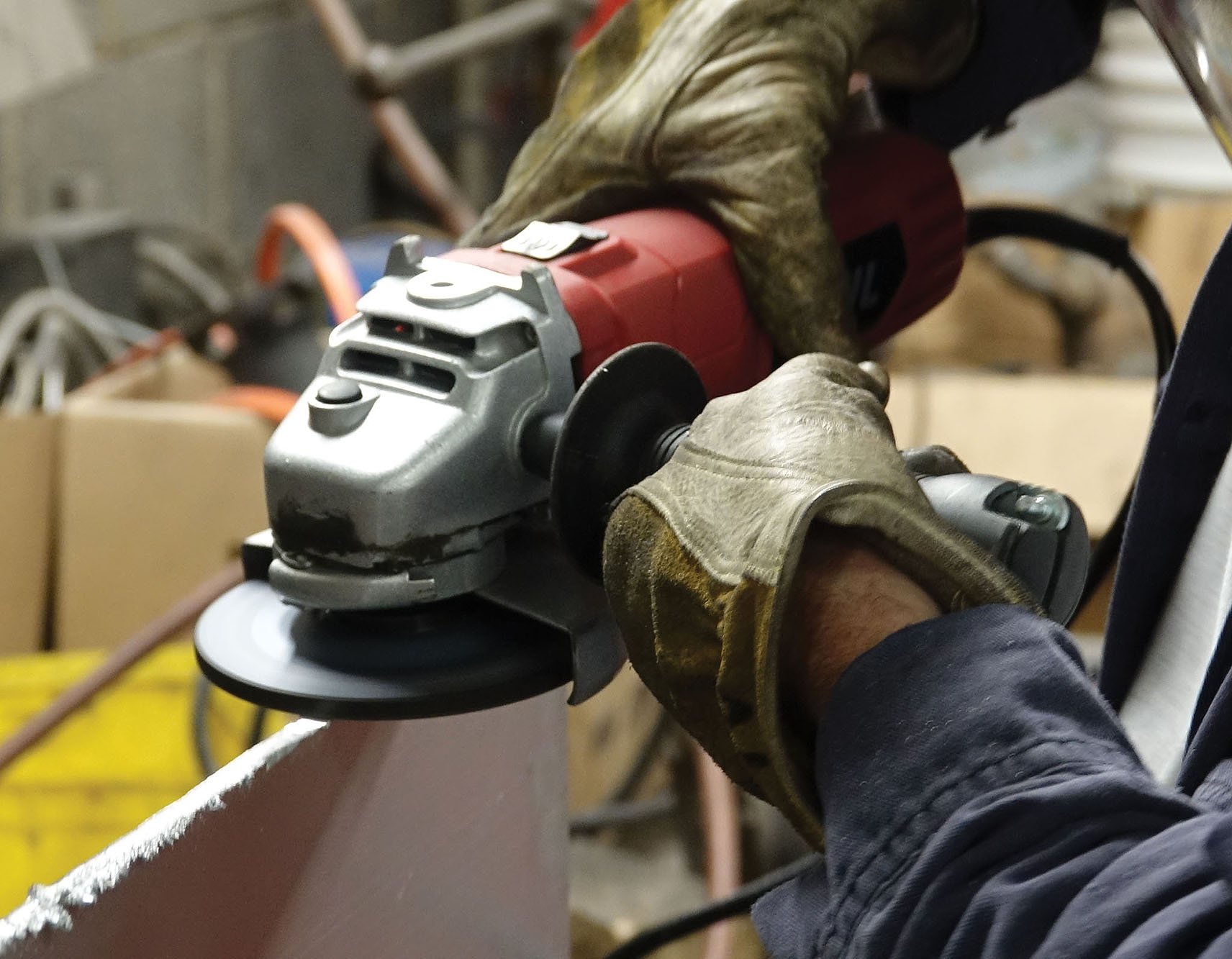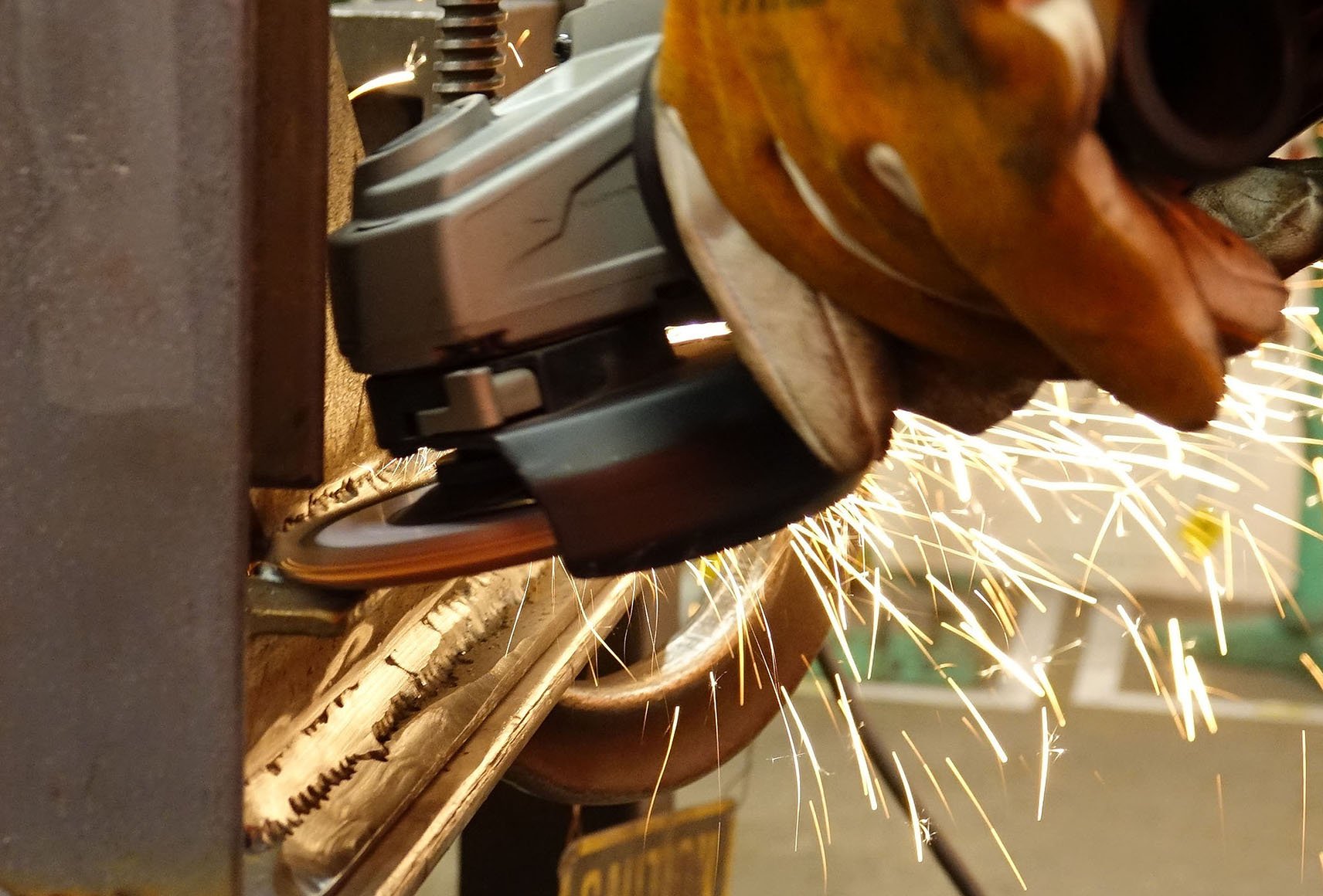Choosing a Grinding Wheel

CHOOSING A GRINDING WHEEL
At Weiler Abrasives, we have an extensive line of abrasive grinding wheels designed to deliver the performance welders and fabricators need to get the job done right and done fast. Our grinding wheels are available in performance tiers, offering a choice between long life, fast cut or both.
METAL GRINDING WHEEL TYPES
We have grinding wheels made for working on all metals in both our Type 27 and Type 28 designs. These wheel styles each have triple reinforcement for added stability in aggressive applications but differ in their profile to offer unique advantages:
- Type 27 grinding wheels: Type 27 wheels have a flat profile with a depressed center that performs best between 25 and 35 degrees. However, effective stock removal with these wheels is achievable at working angles up to 45 degrees.
- Type 28 grinding wheels: Type 28 wheels have a concave design that is aggressive at lower working angles and increases access to tight spaces. Their optimal performance angle is between 0 and 15 degrees from the surface.
GRINDING WHEELS MADE FOR ALL METALS
 Grinding wheels are mixed combinations of resin and abrasive grains. The abrasive does the work and grinds metal when it makes contact with metal surfaces, while the bond holds the abrasives in place and helps the wheel keep its shape. Abrasives vary in strength and hardness. Choosing a grinding wheel with the right composition for the application and material will ensure consistent results and continuous efficiency.
Grinding wheels are mixed combinations of resin and abrasive grains. The abrasive does the work and grinds metal when it makes contact with metal surfaces, while the bond holds the abrasives in place and helps the wheel keep its shape. Abrasives vary in strength and hardness. Choosing a grinding wheel with the right composition for the application and material will ensure consistent results and continuous efficiency.
The grinder also plays a pivotal role in the choice of grinding wheel. Grinding wheels come in different exterior diameters made to accommodate different size grinders. The inner diameter is also important to note. Wheels attach to angle grinders on a spindle, known as an arbor. Arbor size varies, and an exact match for the grinding wheel ensures a secure fit. Our lineup of grinding wheels offers compatibility with 5/8-inch and 7/8-inch arbors, and we have wheels with 5/8-11 threaded arbor hubs for easy spin-on/spin-off mounting.
FINDING A GRINDING WHEEL THAT MATCHES YOUR NEEDS
While grinding wheel size and style are relatively straightforward, it can be a little harder to select a wheel with the right abrasives. For any metalworking application, the best method for choosing a grinding wheel is to start with the material and go from there.
CHOOSING A GRINDING WHEEL FOR ALUMINUM
Aluminum is a preferred material for countless metal fabrication applications due to its lightweight and natural resistance to rust and corrosion. While only weighing around 30% as much as steel, aluminum can be just as strong — and sometimes even more durable when made in the proper alloy. Due to aluminum's composition, fabrication work involving this material requires a grinding wheel for non-ferrous metals. We make an aluminum grinding wheel precisely for this purpose:
- Tiger® Aluminum: Tiger Aluminum grinding wheels are ideal tools for working on aluminum-based alloys. This silicon carbide grinding wheel is enhanced with an aluminum oxide blend for a consistently high cut rate throughout the wheel's life. A non-loading formula keeps the wheel from gumming up, allowing operators to get more work done in less time without compromising durability. Our Tiger grinding wheel for aluminum is contaminant-free, so there will be no after-rust.
CHOOSING A GRINDING WHEEL FOR STAINLESS STEEL
Stainless steel is more resistant to the elements than carbon steel, making it more desirable — and more expensive — so it is critical to choose the right abrasives for grinding applications. The most important factor when grinding stainless steel is to use contaminant-free or INOX wheels. This designation means the wheels are manufactured with additives that contain less than 0.1% iron, sulfur and chlorine. Our grinding wheels overcome this challenge, and we have two options available:
- Tiger Ceramic: Our Tiger Ceramic grinding wheels are our Max Performance option. These stainless steel grinding wheels have the fastest grind rate of our entire line and feature innovative ceramic alumina grain. This contaminant-free grain rapidly cuts through stainless steel at low temperatures to prevent heat damage.
- Tiger INOX: Tiger INOX grinding wheels are free of contaminants and feature bonded abrasives made from white aluminum oxide grains specifically manufactured for working on stainless steel. This grinding wheel delivers a fast cut rate and long product life on stainless steel.
CHOOSING A GRINDING WHEEL FOR CARBON AND STRUCTURAL STEEL
Carbon and structural steel are both durable materials integral to construction and building applications. With the right grinding wheel for carbon and structural steel, grinders are some of the most efficient tools for quickly shaping and grinding large volumes. At Weiler Abrasives, we manufacture several different grinding wheels for use on carbon and structural steel. These leading-edge grinding wheels are all dependable, consistent and made to last. We have options in each of our lines to match any scale operation's needs and budget, including:

- Tiger Ceramic: Tiger Ceramic grinding wheels are our most versatile grinding wheel. This wheel is also our most effective, featuring grains that continually sharpen for reliable results and maximum time on the job. Cool-cutting Tiger Ceramic wheels will produce minimal discoloration on carbon and structural steel workpieces.
- Tiger Zirc: If a high-performance option is required, our Tiger Zirc grinding wheels produce optimal results. These wheels have a zirconia alumina grain infused with advanced ceramic alumina for added boost in cut rate.
- Tiger AO: Our performance line offers the Tiger AO grinding wheel. Tiger AO grinding wheels have a hard resin bond that lasts a long time and contains aluminum oxide grains that will provide an even, clean and sharp cut.
- Wolverine®: If there are industrial-grade grinding requirements, our Wolverine grinding wheels are the best buy. These wheels provide the rapid cut rate and consistent performance needed at a good value to keep operating costs low.
CHOOSING A GRINDING WHEEL FOR HARD-TO-GRIND METALS
At Weiler Abrasives, we produce grinding wheels capable of working on any metal type, including the hardest materials in metal fabrication. For grinding wheels for titanium, armored steel, Inconel®, tool steel, high-nickel alloys and other hard-to-grind metals, get fantastic results with a Tiger Ceramic grinding wheel. These tools take on any metal types and deliver a superior combination of cut rate and wheel life.
NEED HELP MAKING A DECISION?
Our experts are here to assist. Message us for help choosing the right grinding wheel based on the materials you need to shape, the industries you serve and your annual budget. To shop online, view our list of trusted partner retailers.